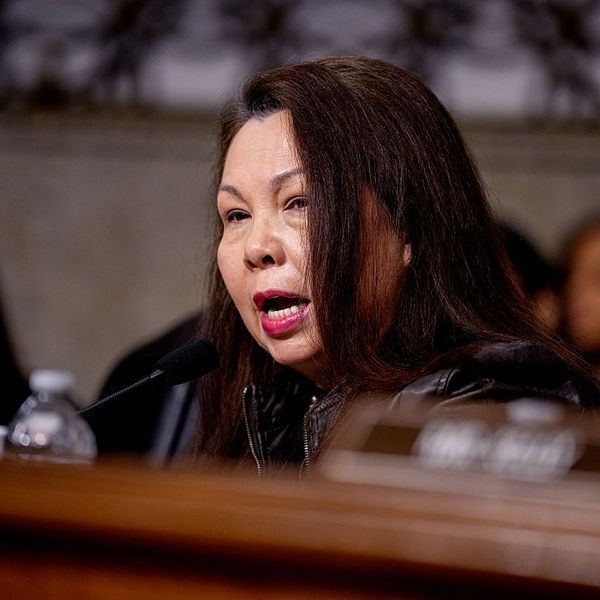Mark well the sequence. On the morning of November 10, President George W. Bush addressed the U.N. General Assembly and spoke words that warmed the hearts of human rights activists the world over:
"For every regime that sponsors terror, there is a price to be paid and it will be paid.... [Nations that support terror] are equally guilty of murder and equally accountable to justice... We must unite in opposing all terrorists, not just some of them. No national aspiration, no remembered wrong can ever justify the deliberate murder of the innocent. Any government that rejects this principle, trying to pick and choose its terrorist friends, will know the consequences.... The Afghan people do not deserve their present rulers.... I make this promise to all the victims of that regime: The Taliban's days of harboring terrorists, and dealing in heroin, and brutalizing women are drawing to a close."
That evening, during a joint press conference with Pakistani President Pervez Musharraf, Bush described the Northern Alliance as "our friends." ("We will encourage our friends to head south across the Shumali Plains, but not into the city of Kabul itself.")
Moments later, Musharraf branded Bush's "friends" terrorists:
"Why I have been recommending that Kabul should not be occupied by the Northern Alliance basically is because of the past experience that we've had when the various ethnic groups were ahold of Kabul after the Soviets left. There was total atrocities, killings and mayhem within the city. And I think if the Northern Alliance enters Afghanistan -- enters Kabul -- we'll see the same kind of atrocities being perpetuated against the people there...."
A reporter followed up by asking Bush if he agreed with Musharraf's assessment of the Alliance. Bush replied, "Only, only, I said one question. Now you're going with three." No other reporter put the question to Bush.
Now that is a disciplined press corps. In the morning, President Bush takes a strong stand against those who terrorize the innocent and brands governments that support such terrorists "equally guilty of murder and equally accountable." In the evening he hails as "our friends" an alliance that has terrorized the innocent (and, by the way, dealt heroin) both as a government (1992-96) and as an opposition force.
For a sampling of Northern Alliance atrocities, see the October 2001 "Background" report from Human Rights Watch. Since 1992, the various Alliance factions have killed tens of thousands of civilians every bit as innocent as America's 9-11 victims; their rap sheets includes rape, torture, summary executions and "disappearances." "To date," states HRW, "not a single Afghan commander has been held accountable for violations of international humanitarian law." (https://www.hrw.org/backgrounder/asia/afghan-bck1005.htm)
Saturday night is followed by Sunday morning, so it was just a matter of time before a Bush administration official would have to explain why the president would describe forces that fit his own definition of terrorists as "our friends," why he was backing them, and what he intended to do to bring his own administration to justice for supporting Alliance terrorists.
Secretary of State Colin Powell looked cool November 11 in the Meet the Press hot seat. His inquisitor, Tim Russert, can be relentless when the topic is a stained blue dress, but he simply is intellectually and emotionally incapable of raising moral questions about U.S. foreign policy. He missed the obvious disconnect between Bush's words and policy.
Thus, Powell never had to say, "I endorse what the president said at the U.N., and as soon as we crush al-Qaida, whether it's next year or next decade, we'll base our foreign policy on his words." He never had to relinquish any moral high ground for a more pragmatic (and defensible) realpolitik position.
On ABC, Slammin' Sam Donaldson did indeed hold National Security Advisor Condoleezza Rice's feet to the fire on state sponsorship of terrorism. Outflanking the Bush administration on the right, Donaldson put on the screen the State Department's list of states that sponsor terror (Iran, Iraq, Syria, Libya, Cuba, North Korea, Sudan) and asked why we aren't taking it to those governments like we're taking it to the Taliban.
Note that Donaldson, in theory, represents ABC's "liberal" wing. For two decades he's been cast as a counterweight to George Will, the staunch conservative of "This Week." Donaldson could have asked why Cuba was on the terror-sponsor list. He could have asked why Colombia was not, given that its army collaborates with and protects a right-wing death-squad federation on the State Department's list of Foreign Terrorist Organizations. He could have quoted from Bush's U.N. speech and the Human Rights Watch report on the Northern Alliance -- or cited the massive U.S. aid to the terror-facilitating Colombian army -- and asked why the U.S. wasn't on the terror-sponsor list.
To ask any of those questions, Donaldson wouldn't necessarily have to be a liberal. He could just as well be a moderate or conservative, many of whom disapprove of selective morality and alliances with cutthroats. But he would have to be informed.
Like most everyone else posing questions on Sunday morning, Donaldson is bright, articulate and ignorant. All are prerequisites: Smarts and a way with words lend an air of credibility; ignorance ensures the avoidance of embarrassing questions about "principles" that seem to be honored more often in the breach.
To gain a coveted seat as a network foreign-policy interviewer, you must be incapable of thinking outside the parameters of bogus State Department lists. Your knowledge must be sufficiently superficial that you cannot recognize an evasive answer or demolish a dishonest one. Mix in an abiding faith in the fundamental decency of U.S. foreign policy and you could be the next Russert, Donaldson or Jim Lehrer.


